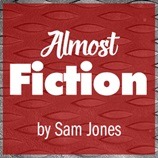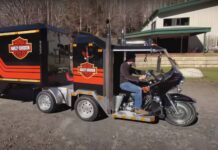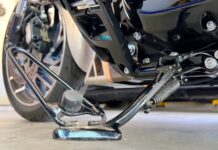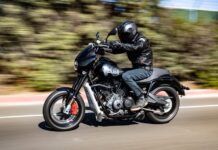In Marvin’s second year of college he bought a motor scooter, a red Italian Vespa. There was nothing unusual about that; it was a large campus and many people used either motor scooters or bicycles to go to classes and get around the town. It wasn’t a real motorcycle which would require a helmet, gloves and boots. He just got on, tied down his books, donned sunglasses, kicked it alive and zipped off to his next class. Marvin liked it. It was fun. He particularly liked the practical simplicity of the machine. He never rode with others in a group, he never told his family he bought a motor scooter. It was his private machine to go wherever he wanted, an apparatus that allowed him to commune with himself, a vehicle which allowed him to dream about riding around Europe with a sleeping bag and a wicker basket filled with cheese and wine.
Soon after graduation he married and accepted a position as a loan officer with a large banking firm. With the Vespa not fitting his newly acquired lifestyle, he reluctantly sold it.
Marvin never got over the loss and always planned on buying another scooter.
While taking in a foreign film with his wife, bored with the subtitles and the plot, Marvin noticed in the background dozens of extras zooming around Rome on Vespas.
Instead of following the movie further, Marvin’s mind wandered back to college and his neglected affection for all things motorized with two wheels.
The next day on his way to a business appointment, by chance, he passed a motorcycle dealer. He was early, there was plenty of time, so he had the cab driver pull up and decided to educate himself on how two-wheeled machines had changed in the last decade. However, this was a real motorcycle dealership; there were no Vespas, no motor scooters at all. Instead, in the center of the showroom, in all its majesty, bedazzled with a fairing, panniers, extra lights and lots of chrome, sat a red Harley-Davidson Electra Glide.
In great detail, the salesman brought him up to speed on the controls, specifications and the extra accessories this particular motorcycle wore. Marvin read the price tag hanging from the handlebars, took out his checkbook and bought it on the spot. He didn’t ride it, he didn’t haggle the price, he had no place to put it, he didn’t have a helmet and he didn’t care. This was unusual. Marvin never did anything sporadically, never anything impulsive. Everything in his life was over-planned, all the details right down to the most trivial were hashed out and if everything didn’t balance out perfectly the notion was dismissed. But on that day, just before lunch, he bought a red Harley-Davidson Electra Glide and still had time to make his business meeting.
He didn’t tell his wife and kept the bike in a rented garage not far from his bank. Eventually, of course, a tattletale bank employee saw Marvin riding the motorcycle to work in his business suit and knowing it was considered contrary to the appropriate image of the banking industry and against company policy, made Marvin’s secret known to everyone.
At the next administrative board meeting with his managing superiors, the riding of motorcycles was an item on the agenda. After a short discussion, it was blatantly stated that no one with a managerial position in the banking industry would ride a motorcycle. Period! His name was never mentioned but everyone knew to whom they were referring.
His wife got wind of the meeting and the motorcycle. That night, at home, Marvin was met by his wife who was loaded for bear. There was no beating around the bush, no cocktails to warm things up, no dinner to take off the edge, she met him at the door and opened up with both barrels.
“Are you completely insane? What could you be thinking? Have you lost your mind? Do you not respect your health? What would I do, how would I live and pay the bills if you were injured or killed riding one of those things? Do you want to be laying in the street bleeding and have your family lose everything? Does your insurance cover riding a murdercycle? Have you overlooked your position at the bank? Is this your mid-life crisis? Do you have a death wish? Have you decided to commit suicide? Are you completely insane?”
She was self-righteous in her contempt. It went on and on and on and on and on until finally after hours of verbal spousal abuse he was completely worn down and agreed to sell the motorcycle. Only then did she shut up and allow him to go to sleep.
They didn’t talk for two days.
A week later he came across a real estate deal which involved a small six-unit industrial building. The price was right, it was a bargain, a very good capital venture and it fit into his tax structure. At dinner, between the carving of the roast beef and the serving of the potatoes, Marvin mentioned it casually as a good investment and that he was thinking of purchasing the property. His wife muttered something in agreement, said it was up to him and the next day Marvin agreed to a short-term escrow and bought the building. Five of the units were already filled with long-established tenants whose rent would more than pay the mortgage. One shop was empty.
Marvin had agreed to get rid of the motorcycle but he lied. He rode his bike to the industrial complex and there he gave his Harley-Davidson a home in the vacant unit. Leaning on her kickstand, sitting by herself in the empty shop she looked like a fine thoroughbred mare, alone in the pasture, lonely, looking for more of her kind. So, in the following weeks, to make her stall homier, he added work benches, an air compressor, a pneumatic lift, shelves to accommodate everything needed for maintenance or repair and the walls started filling with pinned-up maps of places he planned to ride. It was now a proper shop, an appropriate nest for the big bike and a home away from home for himself.
Marvin had never cheated on his wife and not selling the motorcycle was the first time he had ever deceived her but he couldn’t bring himself to get rid of the Harley. Somehow it represented the person he was and not the person he was supposed to be. The motorcycle and the tools were things of consequence, they were substantial, they were function over form. They gave him balance and there was no pretense attached to anything in his shop. He had created a clubhouse for a club with only one member and whenever he was there he was completely at ease with himself.



















